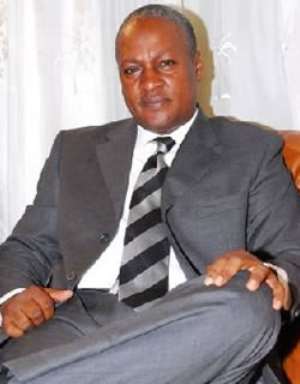
The Vice-President, Mr John Dramani Mahama, has commended former President John Agyekum Kufuor for being among the first to accede to the African Peer Review Mechanism (APRM) on behalf of the people of Ghana.
Consequently, he stated that the National Democratic Congress (NDC) would also ensure the continuation of the good policies and programmes initiated by the Kufuor administration, although they were ideologically opposed to each other.
Mr Mabama made the commendation during a presentation of the 3rd annual progress report on the implementation of Ghana's APRM programme of action during the 10th summit of the APRM forum in Addis Ababa.
"In our country, we have resolved with a common understanding that we may belong to different political persuasions and may have divergent views as to the direction we want to take our country. But, most importantly, we are united around the conviction that in whatever we do, it must be Ghana first and the supreme interest of our people must be paramount."
Presenting a report, Mr Mahama said Ghanaians had confirmed their commitment in the just ended elections that constitutional democracy was their preferred system of governance and had become conscious that as voters, they were the ones to make and unmake a government.
"Political competition generally enjoys an even playing field and there is a growing popular confidence in the Electoral Commission as an independent and autonomous institution capable of conducting free, transparent and credible elections," he added.
However, he stated that a disturbing element about the elections was the high numbers of rejected ballots due to improper voting.
This calls for voter education, and it was hoped that the institutions charged with this education would live up to expectation.
Another challenge to Ghana's democracy, Mr Mabama noted was the one month short period of transition between the holding of elections and the swearing in of the new administration, and that where there was a run-off as it was in the last elections, the transition period was reduced to barely a week.
Concerning the promotion of participation of civil society in governance, he said Ghana had an articulate and vibrant civil society that had contributed immensely to deepen democracy and constitutional rule.
He said during the recent elections, the civil society was responsible for conducting both presidential and vice-presidential public debates, and described them as largely responsible for ensuring the peaceful conduct of the elections.
Regarding economic governance and management, Mr Mahama said the year 2008 had been challenging in the management of macroeconomic stability. This was due to the external shocks in the form of soaring oil and food prices as well as the global financial crisis and challenges in fiscal and monetary policies.
He said the result was that inflation, interest rate and fiscal deficits had all increased and until they were arrested, they posed a major threat to the health of the economy.
"These challenges notwithstanding, the economy has seen real GDP growth increase marginally and growth rates have consistently averaged six per cent. Again, there have been improvements in tax administration, but roping in the informal sector for effective taxation remains a challenge," he added.
According to the vice-president, management of public finance had been characterised by uncertainty and instability, and to address these, a public finance management programme dubbed "Growth and Stability Compact" had been initiated.
The main objectives of the compact, he said, included having a fiscal rule, which would quantitatively target debt-to-GDP ratio, the proper selection of projects to be included in the public investment budget, undertaking a rigorous debt sustainability analysis as part of public debt management strategy and encouraging the private sector to participate in key infrastructure development to enhance public-private partnership for accelerated growth.
Touching on corporate governance, he said in spite of improvements made at the Registrar General's Department (RGD), it needed to be effectively decentralised and must collaborate with the Ghana Statistical Service to identify dormant companies.
He added that the Ghana Investment Promotion Centre (GIPC) had submitted a draft, GIPC Law, to key stakeholders at a meeting organised by the Private Enterprise Foundation to review it, explaining that absence of the revised law had significantly affected the business of particularly retail traders in the country and had been a contributory factor to the dumping of foreign goods on the Ghanaian market.




 Lay KPMG audit report on SML-GRA contract before Parliament – Isaac Adongo tells...
Lay KPMG audit report on SML-GRA contract before Parliament – Isaac Adongo tells...
 Supervisor remanded for stabbing businessman with broken bottle and screwdriver
Supervisor remanded for stabbing businessman with broken bottle and screwdriver
 NDC watching EC and NPP closely on Returning Officer recruitment — Omane Boamah
NDC watching EC and NPP closely on Returning Officer recruitment — Omane Boamah
 Your decision to contest for president again is pathetic – Annoh-Dompreh blasts ...
Your decision to contest for president again is pathetic – Annoh-Dompreh blasts ...
 Election 2024: Security agencies ready to keep peace and secure the country — IG...
Election 2024: Security agencies ready to keep peace and secure the country — IG...
 People no longer place value in public basic schools; new uniforms, painting wil...
People no longer place value in public basic schools; new uniforms, painting wil...
 'Comedian' Paul Adom Otchere needs help – Sulemana Braimah
'Comedian' Paul Adom Otchere needs help – Sulemana Braimah
 Ejisu by-election: Only 33% of voters can be swayed by inducement — Global InfoA...
Ejisu by-election: Only 33% of voters can be swayed by inducement — Global InfoA...
 Minority will expose the beneficial owners of SML, recover funds paid to company...
Minority will expose the beneficial owners of SML, recover funds paid to company...
 Prof. Opoku-Agyemang has ‘decapitated’ the NPP’s strategies; don’t take them ser...
Prof. Opoku-Agyemang has ‘decapitated’ the NPP’s strategies; don’t take them ser...
